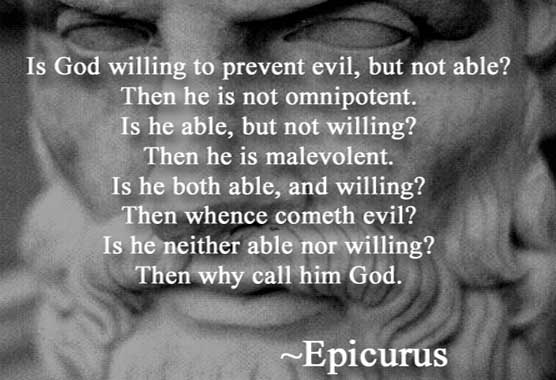What if God is both able and willing to prevent evil, but He can only accomplish His goal in a period of time that appears very long to the human mind but very short to Him? In other words, what if He's working on creating a Utopian world where humans live forever without pain or suffering as the Scriptures say? See Isaiah 65:20-25; Revelation 21:1-4.
Claiming that it's "God's Will" or that it's part of "God's Plan" or that "God works in mysteries ways" is disgusting and is not a valid excuse.
Why would an
infinitely powerful being make us suffer for 1000's of years just to create his version of a utopia in the far future?
This just proves that either
1. God doesn't exist.
2. God doesn't care.
3. God is not who we think he is.
Either way, what ever type of God may exist, he is not doing anything right. And if this is all part of God's Plan, then his plan is
obsolete.
Faith in God only justifies your own fear of death, confirms your lack of trust in reason, and proves your own cowardice to seek your own salvation.
Even if you could prove to me his existance, I would still want to seek my own salvation.
Btw, since we are all children of God (and despite the fact that he supposingly loves us all equally), what kind of child do you think God will be impressed by more ... a weak child that is constantly begging their parent to do everything for them ... or a child that seeks to fend for themselves?
If you were in God's shoes, who do you think he will be more proud of ... someone who is trying to constantly suck up to him like a teachers pet ... or someone who is trying to reach his level all by themselves?
As a parent, what kind of child would you be more proud of ... a child that is always crying and coming to you for help (who is afraid of his own shadow, and when he finishes school, he lives in your basement, etc) ... or a child that strives to be great all by themselves (for instance by getting straight A's, by being the best athlete, by going to college and getting a high paying job, etc).
If God loves us all, then not only will he not care if someone is an atheist, but he will also show more compassion towards souls that remind him of himself.
And if this is not the kind of God that exists (an all loving one), then he is not worthy of any worship or praise, and should be destroyed by any means necessary.




























































